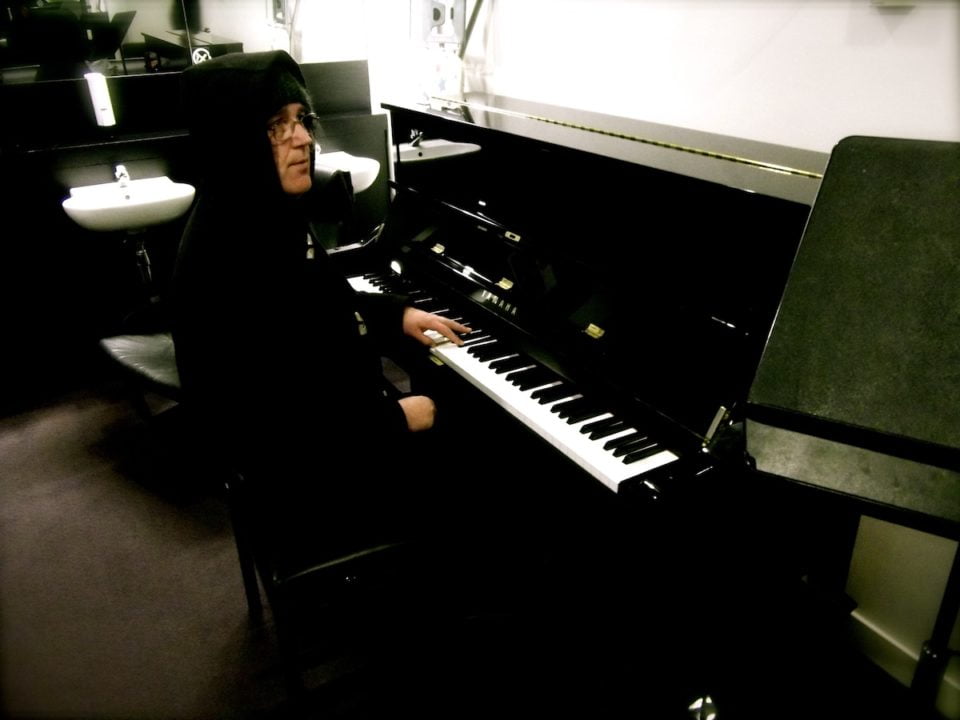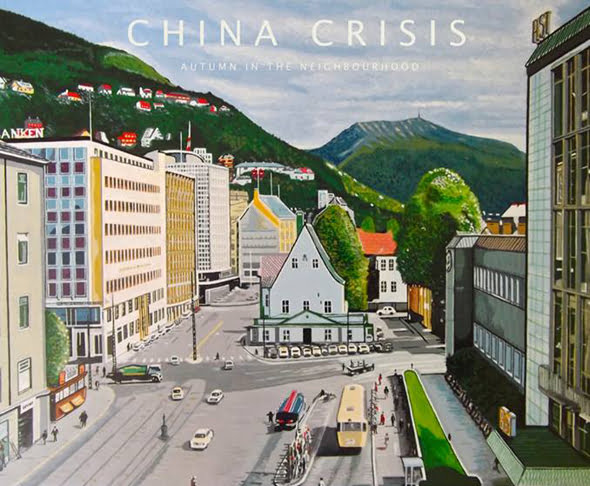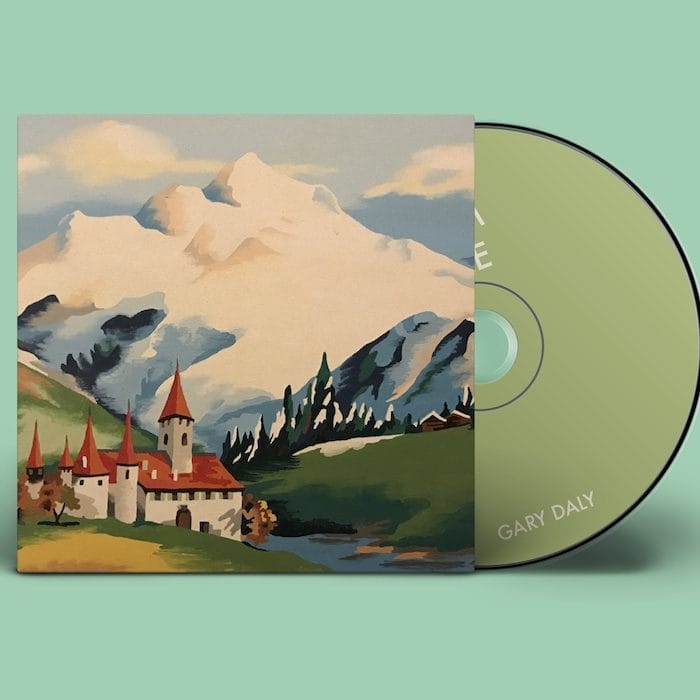CHINA CRISIS’ LEAD SINGER GARY DALY HAS JUST RELEASED HIS DEBUT SOLO ALBUM, GONE FROM HERE, AND IT MIGHT JUST BE THE BEST THING YOU’LL HEAR THIS YEAR. ANDY JONES TALKS TO GARY ABOUT RETURNING TO HIS SYNTH ROOTS AND ENGAGING WITH A NEW BAND OF MUSICIANS TO PRODUCE A PERFECT BLEND OF MELANCHOLIC, YET UPLIFTING POP…

Gary Daly is a prolific songwriter, of that there’s no doubt. Think Tragedy And Mystery, Christian, King In A Catholic Style (Wake Up), Arizona Sky, Black Man Ray and a hundred other China Crisis songs on which he has a credit. Yet the revival of his band’s live fortunes – China Crisis have at least 70 gigs booked for this year alone – has meant that many of his written works don’t get the chance to reach ‘Possible Pop Song’ status.
That’s about to change with his debut solo album, though. Gone From Here has been such a long time coming, and has such a pedigree of musicians and producers involved, that you can almost anticipate the quality. Daly has drafted in favours, fans and Grammy winners – plus a sackload of old synths from the China’s debut recordings – and sprinkled the whole work with a summery and melancholic charm that makes it an album that will be not only be adored by vintage Crisis lovers, but one that their children might well embrace, too.
Album opener Write Your Wrongs sets out an electronic stall, with drum sounds that have been missing since 1983, while tracks like I Work Alone maintain a definite synth-pop vibe. Between these, however, beautiful and more acoustic tracks often surface. There’s Of Make Do And Mend with its delicate classical sensibilities, while Carousel Of Stars takes you on another journey entirely, a collaboration with It’s Immaterial’s John Campbell, complete with his distinctive vocals. Low Tide is perhaps the most obvious Crisis-alike track here, but then there’s In The Cloudy Domain, a song that pushes you up to completely unexpected highs. With its huge vocal range, Daly would love to see Adele give it a go – “she’d have the whole world in tears if she sang that,” he later laughs (and he’s not wrong) – it’s yet another of the album’s varied highlights.

“More than anything it’s a bit more personal with my material,” Gary replies. “For a China Crisis record, Ed [Eddie Lundon, China Crisis co-founder] and I have to be in agreement that the song is great and that we both want to work on it. There’s one on the new album that could have made it to the last China’s record, but Ed wasn’t that keen, and I’d never make him work on something that he wasn’t enjoying or relating to.”
Which all means that Eddie had no involvement with the new record and really, if he had, then that would have made it a China Crisis album, right?
“Yeah, that’s it really. If it is us two, then it is China Crisis. But I did pass songs to Eddie and he liked them, but he has a full-time job in the Liverpool Institute Of Performing Arts, he works full-time with China Crisis and he loves his football, so I didn’t want to have to cajole him in!”
And, to confirm, a future Crisis album is definitely on the cards: “Oh I would have thought so, yeah, definitely. If nothing else because I’ll be going, ‘Right, what to do with all these other songs?!’”
Daly Star
The next item on the agenda is the length of time it’s taken Gary to release Gone From Here, especially as we first got wind of his solo material back in 2008. “I know, I’ve been working on it for years!” he laughs. “I mean, not on this specific album but I’m always writing and recording, and there was always stuff for a solo album. In fact, I’ve never understood why it’s just one – there should be at least a dozen out there!”
“Back in 2012/13 I’d been working on the solo thing and had some unfinished stuff,” he continues. “It was at that time that the whole crowdfunding thing was really taking off and I said to Ed, ‘Let’s send out one of the tracks that I’ve done and see what people think,’ so we sent it to a few people in the industry and didn’t say it was just me, but they all got back thinking it was new China Crisis material. So that got me to thinking, ‘Well, no one is waiting for a Gary Daly album, but they are interested in a China Crisis album.’”
This interest led to the Pledge Music-funded China Crisis LP Autumn In The Neighbourhood, and while that meant that Daly had to shelve the plans for his solo work, the experience did eventually help him to revisit the idea.
“The Pledge Music thing informed me so much,” he says. “It was like the indie music scene at the end of the 70s and start of the 80s. It is up to you how much you want to do and I quite like that. Also I have discovered more people to work with, like David Berger from Outfit, who produced and engineered the new record. I first met him when he did our cover version of the Carole King song It’s Too Late [for the album 80’s Re:Covered]. I was a mad fan of Outfit, a Liverpool band who only released two albums. So it was things like that really, finding new places to work in and new people to work with – everyone like Tom Moth from Florence + The Machine, Jonathan Aasgaard from the Royal Liverpool Philharmonic and John Campbell from It’s Immaterial. There were no limits and whatever I could make happen was exciting in itself.”
‘I just love the idea of it resonating really well with a small number of people… I want them to play it in their cars as they’re heading towards their summer holidays’
That John Campbell collaboration, Carousel Of Stars, is an album highlight, but originally it was simply a Gary Daly song, albeit one that wasn’t working out.
“I recorded it at David [Berger]’s place,” Gary explains. “But when I got it home, it wasn’t feeling very ‘real’, so I got David to take my vocals off and make it an instrumental. I had that on in the car and found myself singing along to it in John Campbell’s voice from It’s Immaterial’s Driving Away From Home. Well, he lives just around the corner from me, so I thought I’d ask him if he would like to hear it. He took it away and sent back his dialogue and I came up with a chorus. It’s a beautiful thing: him talking about walking in the park and looking down on the city. His voice is one of the great voices of 80s pop and the fact that we were both on Inevitable Records back in 1981 was just even better.”
The synths crop up more on this solo album than they have on any recent China Crisis LP, and this was a direction that Gary wanted to explore, but not for the first time…
“Yeah always,” he says. “I’m the synth guy in China Crisis. The first two albums was all me on them, a bit of Ed doing guitars, drum machines and some synths, but I was the synth guy and sort of prided myself on that. But then we got a band full of musicians in – like Nick Magnus on keys and Brian McNeil, a virtuoso player – so I gave it all up, under duress. I would still write on the synths – Arizona Sky and so on – but then you’d have someone like Brian play the parts, or Kevin play all the drum machine parts because, boom, you have this amazing drummer making it a hundred times better.”
 Chinese Whispers
Chinese Whispers
For much of the new record, then, Gary returned to that pre-band synth writing process, even to the point of tracking down some of the old gear.
“Tracks like I Work Alone could almost be from the first China Crisis album,” he admits. “Everyone from the mix engineer Mark Pythian to Chris Barlow – all of us have all of that old gear. We even had this rack unit that both Ed and myself used back in the 80s. It’s not too retrospective and contrived, but having that old gear in the studio was amazing, so it felt lovely and we were really adamant to enjoy it all as much as we could as we didn’t have the luxury of loads of time in the studio.”
Yes, studios still cost a lot, and even though there were many locations and musicians used for the album, Gary is well aware that album sales will never be what they were, so Gone From Here became a more cooperative effort. However, the lack of budget, he believes, almost made it work better…
“Obviously people do get paid,” he says, “but not like they would have and everyone understands that, but that makes it quite nice, just making it as good as it can be for all the right reasons. People like Tom [Moth] gave his time for free which was stunning. He’s been a fan since he was eight years old. With Mark Pythian, who mixed it, there’s a photo of him on the sleeve wearing a China Crisis Tragedy And Mystery T-shirt when he was about 15 or 16. He ended up being the tea boy at Amazon [Studios] when we did Working With Fire And Steel and now has three Grammys!”
Finally, what expectations does Gary have for Gone From Here?
“With the Chinas we know we have an audience, but with this album it’s a bit more precarious. Like I said to Ed, the albums we made had budgets of a quarter of a million pounds or more, and mine’s had a budget of two and sixpence, so if people are going to compare it, then it is a bit unfair. But I think I’ve done alright – my record’s like a little indie film whereas some of the China Crisis albums are like Hollywood blockbusters! So I just love the idea of it resonating really well with a small number of people. I want them to play it in their cars as they’re heading towards their summer holidays. I want them to arrive at the beach and all pile out of the car after listening to it, with the mum and dad playing it and the kids not minding too much.”
Andy Jones
Classic Pop may earn commission from the links on this page, but we only feature products we think you will enjoy.


 Chinese Whispers
Chinese Whispers

